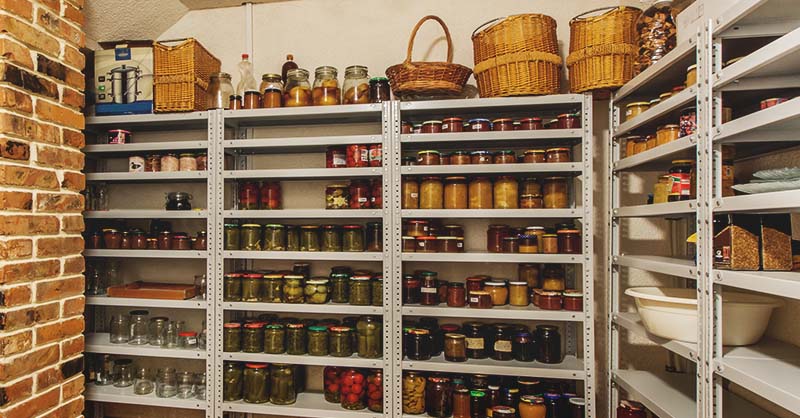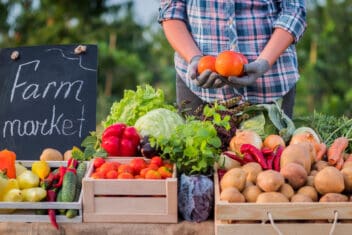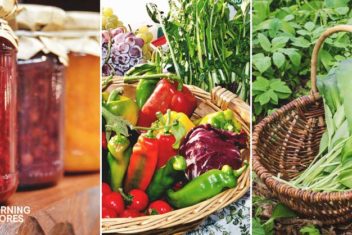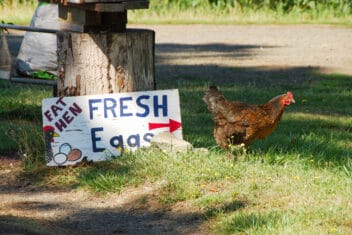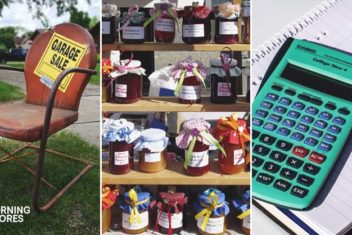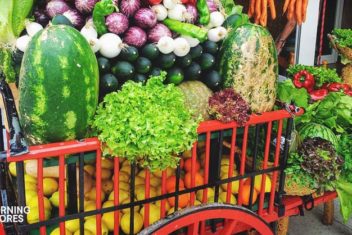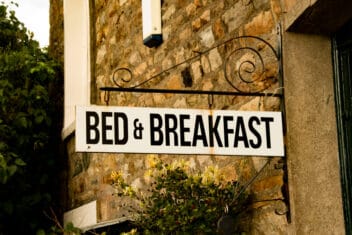Having a side hustle or two is a great way to make some extra cash. Some homestead side hustles can end up becoming a source of full-time income, but you have to make sure its a legitimate way to make money from your home. That’s why you need to know your state’s cottage food laws.
It seems like everyone has a side hustle these days. Some make and sell things that they create from their Cricut, while others could sell knitted sweaters. You might want to sell homemade jam or want to make money baking bread and cakes.
No matter how you make some extra cash, you need to be sure you’re doing it legally. So before you get your homemade chocolates all loaded up for selling at the market, let’s learn about cottage laws.
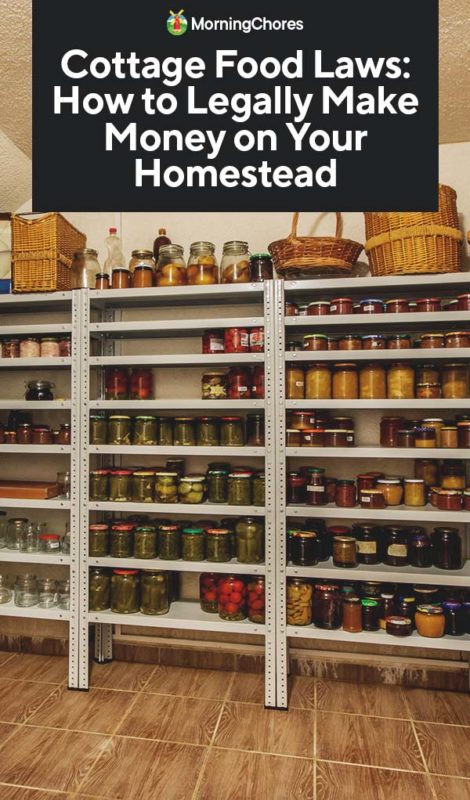
Why Do Cottage Food Laws Matter?
You don’t want to break the law, right? Of course not. Cottage food laws do more than outline when we are within our legal rights to sell what we create. They go deeper than that. These laws help encourage the market for local, small production. People want homemade goods and organic foods, and these laws allow more people to sell unique items at your local farmer’s markets.
It also means that, as a customer, you’re purchasing food from a local entrepreneur. If they have a label on their products, you understand that this individual is following the law, and that keeps you safe, as well.
Aside from making it easier for you to find organic, homemade food and for you to have a side hustle, these laws protect you. With proper labeling, customers understand that they’re purchasing food that isn’t coming from a commercial kitchen. That’s similar to an eat-at-your-own-risk type label. It helps protect you if you’re operating within the scope of the law and following it correctly.
What Are Cottage Food Laws?
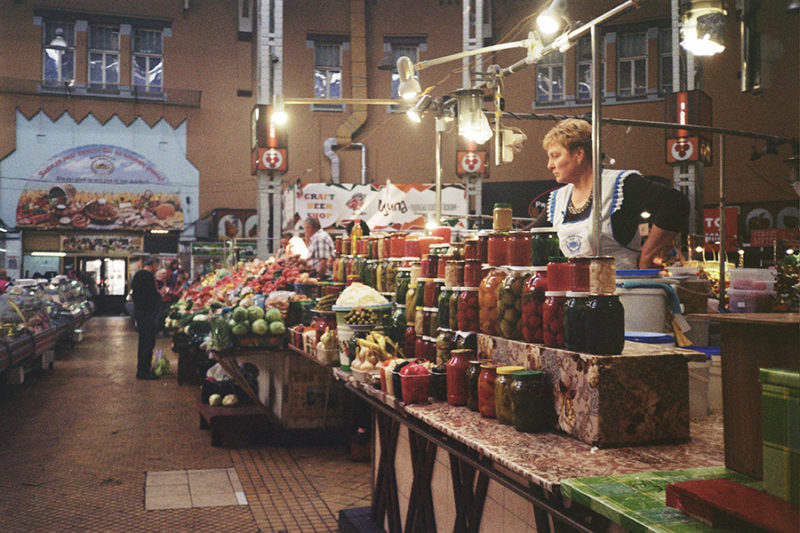
If you head to the farmer’s market, you might find someone selling cookies or jars of jams and jellies. These people should be operating under your state’s cottage laws. Cottage food laws are for people who want to sell shelf-stable and low-risk food products from their home without the necessity of a commercial kitchen or regulatory inspections.
Cottage food laws are a set of more lenient regulations, so small entrepreneurs, such as you or me, can sell homemade foods to the public. It means you don’t need an expensive food license that the more extensive facilities require.
Most Cottage Food Laws cover a few things, such as:
A Disclaimer or Labels
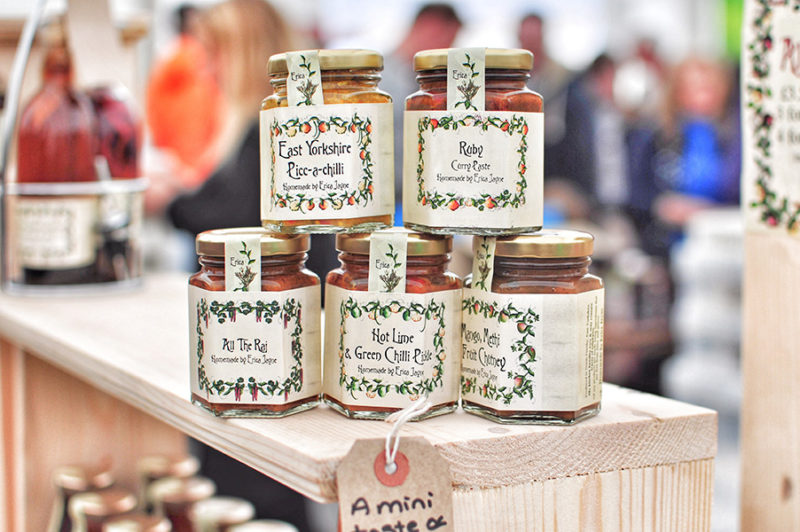
Many of these laws focus on having some form of a “disclaimer” type labeling. Each state is different about what type of label you need to put on your goods. Let’s look at an example.
According to the State of Arkansas, “Cottage Foods must be labeled with the name and address of the manufacturer, the name of the product, and ingredients in the product. Nutritional claims are not allowed.”
Income Cap
Depending on your state, there might be an income cap that indicates when you would need to pursue a commercial kitchen and stricter regulations. Here is an example.
According to the laws in the District of Columbia, “Annual revenue from the sale of cottage food products shall not exceed $25,000.”
Where You Can Sell Your Goods
Some cottage laws tell you where you can legally sell your goods. Let’s look at an example.
According to the State of Alabama, “cottage foods may be sold from home or at local state-sanctioned farmer’s markets. Cottage food cannot be sold at the following:
Restaurants, Novelty Shops, Grocery Stores, Over the Internet”
Specific Foods
States don’t want home entrepreneurs selling particular foods. They ban certain foods that have an involved storage or preparation process. We’ll cover that in a moment, but let’s take a look at Ohio and what they do not allow to be sold.
According to the State of Ohio, ‘”A Cottage Food production Operation is not permitted to processed acidified foods, low-acid canned foods, potentially hazardous foods or non-potentially hazardous foods not listed above.”
What Foods are Legal to Sell Under Cottage Laws?

It’s important to remember that each state has different laws, so what you can and cannot sell will vary significantly from state to state. You have to do your research to find out what your state allows when you plan your business. At the end of this article, you’ll find links where you can discover cottage food laws for all 50 states.
Some examples of foods that usually are permitted in most states include:
- Bread and other baked goods
- Jams
- Jellies
- Pickles
- Dried Herbs
- Popcorn
Common Foods that You Cannot Sell Under Cottage Laws
Perhaps most importantly, you need to look at what you are NOT allowed to sell based on these laws.
Here are some examples of common foods that can’t be sold under cottage food laws.
- Fermented Foods
- Canned Vegetables
- Dried Meats or Seafood
- Canned Soups or Meat
How to Read Your State’s Cottage Food Laws
We mentioned that all states have different requirements, and that can make it confusing. So, to make it a bit easier, let’s go through how to read your state’s cottage food laws so that you don’t miss anything important. We will cover basic questions that you need to ask yourself as you’re reading the laws.
For this example, we will look at the laws of Mississippi to answer the questions. To find all of the answers to the following questions and the quoted law, please see the State of Mississippi’s Cottage Food Laws.
1. Where Am I Allowed to Make My Cottage Foods?
First, take a look at where the law states that you can make your food. According to Mississippi law, cottage food products are types of foods that you make in the kitchen of your private home. A private home is defined as:
“This is the place where you live, you own the home or are renting. So, a house, an apartment, condominium, or a rental home all could be a private home.
Additionally, the law in Mississippi shows that operators are not allowed to make products in an outbuilding, such as a shed or barn. All products must be made in your home kitchen and stored in your domestic residence. That’s an important note because many people like to can products outside, but that would be breaking the law in Mississippi.
2. Where Am I Allowed to Sell My Cottage Food Products?
One big thing to consider is where you’re allowed to sell your goods. In today’s world, many people want to sell items online, so you have to be sure that’s legal.
In Mississippi, cottage food operators are allowed to sell directly to people, such as at a farmer’s market. Indirect sales, such as to a restaurant, aren’t allowed. However, the Cottage Food Bill prohibits the sale or offer of cottage food products over the internet, which includes Facebook or other social media.
3. Where Am I Allowed to Sell My Cottage Food Products?
Before you decide, you have to look at the permitted foods under the state’s laws. Most states want only the sale of non-potentially hazardous foods that don’t require time and temperature control for food safety.
For our example state of Mississippi, we can see that the state allows plenty of options for what entrepreneurs can sell. Examples like:
- Baked goods without cream or custard
- Candy
- Chocolate-covered nonperishable foods such as chocolate-covered peanuts and almonds.
- Dried fruit
- Dried pasta
- Spices
- Fruit pies
- Jams, jellies, and preserves
- Popcorn
4. Is There an Income Limit for My State?
You need to see if there is a limit on how much food you can sell per your state law. In our example state of Mississippi, we can see that the state sets a limit of $20,000 in gross annual sales of cottage foods.
5. Do I Need Specific Commercial Kitchen Appliances?
Wondering if you need to purchase commercial kitchen appliances? That would increase your business costs and might be a deterrent from starting your cottage food business.
According to the State of Mississippi, cottage food operators aren’t required to provide equipment that meets commercial standards to make cottage food products.
6. Do I Need to Label My Cottage Foods? If So, What Should The Labels Say?
Labeling your products is a big deal in most states, and it’s an important step. You have to pay attention to your requirements so that you don’t miss it. You’ll need labels, a printer, and a template to use for your products.
Let’s look at our example state, Mississippi, to see what you might need to find out when you read your state’s law.
According to the State of Mississippi, “Yes. The label must include all of the following:
- The name and address of the cottage food operation
- The name of the cottage food product
- The ingredients of the cottage food product, in descending order of predominance of weight
- The net weight or volume of the cottage food product
- Allergen information as specified by federal labeling requirements
- If any nutritional claim is made, appropriate nutritional information as specified by federal labeling requirements
- The following state printed in at least ten-point type in a color that provides a clear contrast to the background of the label: Made in a cottage food operation that is not subject to Mississippi’s food safety regulations.”
7. Do I Need Any Permits or Licenses to Run a Cottage Food Operation?
Here is a big one! You want to know if you need a permit or license. These are steps that might be necessary, and the organizers of farmer’s markets might ask to see your permit or license before you set up.
In Mississippi, the law tells cottage food operators to check with their city or county if they’re outside the city limits to determine if you need a business license or other permits. You also need to take taxes, zoning, and insurance into consideration.
8. Is My Home Subject to Inspection by the State?
Finally, you probably want to know if you need to pass an inspection by the state. Inspections could be a necessity, and you need to be prepared for that possibility.
For those living in Mississippi, inspections are only conducted if a complaint is received that the cottage food operator has produced contaminated or unsafe food. In some circumstances, laboratory confirmation might be required.
Cottage Laws By State
Remember, it’s crucial for you to research the laws in your state before selling anything. You might also need a state business license, a city license, and you may be required to pay local sales taxes. Learn the laws of your state before you get started!

